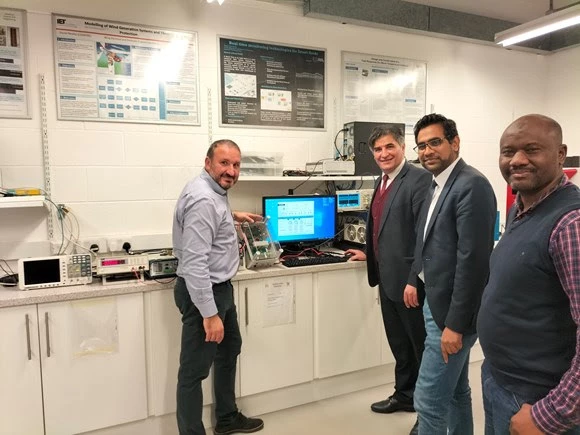
Teesside University and Sheffield Hallam University team up to address net zero skills gaps
Staff from the University’s School of Computing, Engineering & Digital Technologies are working with counterparts from Sheffield Hallam University on a collaborative project looking at how to address skills gaps in Net Zero power systems.
In particular, the project will look at Embedded Digital Control of Power Electronic Converters (EDCPE) which is the use of specialised software to control energy systems and interface with other connected systems. With the increased focus on clean energy technologies including battery management systems, electric drives, smart grids, and electronic vehicle charging, EDCPE skills are in high demand.
The research project, ‘Toward building skills and awareness in embedded digital control of power electronic systems’, aims to develop a teaching curriculum which will develop knowledge and reduce skills gaps in this area.
It has been funded with a £49,762 grant from Innovate UK, part of UK Research and Innovation, and will involve working closely with industry partners to develop education materials for undergraduate and postgraduate students to support the development of qualified engineers in the sector.
The project leader, Dr Maher Al-Greer, associate professor in power conversion and advanced control at Teesside University, said: “We are delighted to have received this funding from Innovate UK.
“EDCPE is paramount for the development and performance of power converters with multiple applications in industry. The UK now has a shortage of engineers with the necessary abilities to fill the rapidly expanding demand for this knowledge. Therefore, there is an urgent need for extensive training or retraining.
“Through this project, we will design a generic curriculum framework as well as an educational toolkit with learning materials, online webinars and in-person training to develop expertise and boost the availability of qualified engineers. This will reduce time to market, and raise the profile of EDCPE, and also increase awareness of the power electronics industry.”
The initial stage of the project will involve establishing a steering group with representatives from multiple sectors including maritime, rail, automotive and renewables.
Dr Ruben Pinedo-Cuenca, business innovation manager at Teesside University, added: “Forging a smarter, green industrial economy is at the very heart of Teesside University’s research strategy.
“Therefore, we are delighted to be taking part in this project and working with partners to look at how we can address skills gaps and develop a labour force which is fully able to take advantage of the myriad possibilities presented by Net Zero technologies.”
Next year will see the opening of Teesside University’s £13.1m Net Zero Industry Innovation Centre which will place the Tees Valley at the heart of the UK’s green industrial revolution. The research project is part of 16 initiatives from across the UK chosen by Innovate UK to share in £4m of funding to help create the workforce of the future through its Driving the Electric Revolution challenge.
By Mark Adair – Correspondent, Bdaily
- Add me on LinkedIn and Twitter to keep up to date
- And follow Bdaily on Facebook, Twitter and LinkedIn
- Submit press releases to editor@bdaily.co.uk for consideration
Looking to promote your product/service to SME businesses in your region? Find out how Bdaily can help →
Enjoy the read? Get Bdaily delivered.
Sign up to receive our daily bulletin, sent to your inbox, for free.






 A legacy in stone and spirit
A legacy in stone and spirit
 Shaping the future: Your guide to planning reforms
Shaping the future: Your guide to planning reforms
 The future direction of expert witness services
The future direction of expert witness services
 Getting people into gear for a workplace return
Getting people into gear for a workplace return
 What to expect in the Spring Statement
What to expect in the Spring Statement
 Sunderland leading way in UK office supply market
Sunderland leading way in UK office supply market
 Key construction developments in 2025
Key construction developments in 2025
 Mediation must be part of planning process
Mediation must be part of planning process
 From apprentice to chief financial officer
From apprentice to chief financial officer
 Don't stifle growth with apprenticeship cuts
Don't stifle growth with apprenticeship cuts
 The start-up landscape: What lies ahead in 2025
The start-up landscape: What lies ahead in 2025
 JATCO adds welcome drive to automotive sector
JATCO adds welcome drive to automotive sector